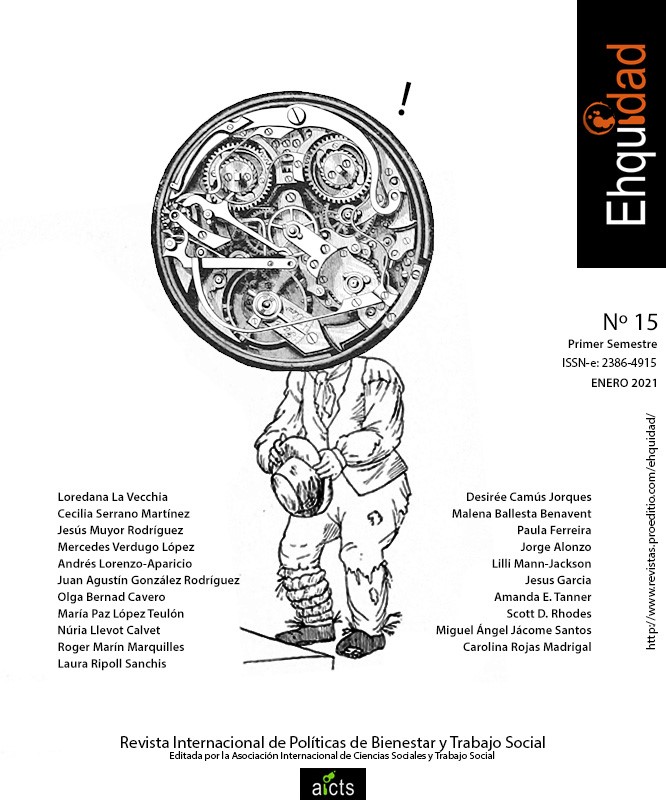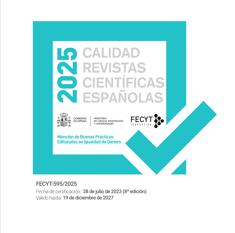Meeting the needs of young Latino gay, bisexual, and other men who have sex with men (MSM) and transgender women living with HIV through the weCare intervention in the United State (U.S.)
DOI:
https://doi.org/10.15257/ehquidad.2021.0009Keywords:
Social networks, HIV, Immigrants, Viral suppression, Young MSM/transgender womenAbstract
Objective: Young gay, bisexual, and other MSM (men who have sex with men) and transgender women in the United States (US) who are living with HIV, and particularly those who are Latino, have low rates of viral suppression. The weCare intervention uses social media to increase HIV care engagement.
Method: We used community-based participatory research to develop the intervention as well as theory-based social media messages tailored to each participant’s unique context. We analyzed elements and characteristics of weCare, messages sent by the Cyber Health Educator (CHE), and lessons learned to meet the needs of Latino participants living with HIV.
Results: We identified 6 core elements, 5 key characteristics, effective social media messages used in implementation, and 8 important lessons regarding relationships between the CHE and HIV clinics, the CHE and participants, and participants and the health system.
Conclusions: Social media offers a promising platform to retain young Latino gay bisexual and other MSM and transgender women living with HIV in care and achieve viral suppression.
Downloads
References
Bandura, A. (1986). Social Foundations of Thought and Action: A Social Cognitive Theory. Englewood Cliffs: Prentice-Hall.
Buchacz, K., Armon, C., Tedaldi, E., Palella, F. J., Novak, R. M., Ward, D., . . . Brooks, J. (2018). Disparities in HIV viral load suppression by race/ethnicity among men who have sex with men in the HIV Outpatient Study. AIDS Research and Human Retroviruses. doi: 10.1089/AID.2017.0162 [doi]
Centers for Disease Control and Prevention. (2019). HIV Surveillance Report, 2018 (Vol. 30). Atlanta, GA: Centers for Disease Control and Prevention.
Crepaz, N., Dong, X., Hess, K. L., & Bosh, K. (2020). Brief report: Racial and ethnic disparities in sustained viral suppression and transmission risk potential among persons aged 13-29 years living with diagnosed HIV infection, United States, 2016. Journal of Acquired Immune Deficiency Syndromes, 83(4), 334-339. doi: 10.1097/QAI.0000000000002277
Delbecq, A. L., Van De Ven, A. H., & Gustafson, D. H. (1986). Group Techniques for Program Planning: A Guide to Nominal and Delphi Processes: Green Briar Press.
Eng, E., Rhodes, S. D., & Parker, E. A. (2009). Natural helper models to enhance a community's health and competence. In R. J. DiClemente, R. A. Crosby & M. C. Kegler (Eds.), Emerging Theories in Health Promotion Practice and Research (Vol. 2, pp. 303-330). San Francisco, CA: Jossey-Bass.
Freire, P. (1970). Pedagogy of the Oppressed. New York, NY: Herder and Herder.
North Carolina HIV/STD Surveillance Unit. (2019). 2018 North Carolina HIV/STD Surveillance Report. Raleigh, North Carolina: North Carolina Department of Health and Human Services.
Pew Research Center. (2019). Social Media Fact Sheet. Washington, DC: Pew Research Center.
Relf, M. V., Pan, W., Edmonds, A., Ramirez, C., Amarasekara, S., & Adimora, A. A. (2019). Discrimination, medical distrust, stigma, depressive symptoms, antiretroviral medication adherence, engagement in care, and quality of life among women living with HIV in North Carolina: A mediated structural equation model. Journal of Acquired Immune Deficiency Syndromes, 81(3), 328-335. doi: 10.1097/QAI.0000000000002033
Rhodes, S. D., Alonzo, J., Mann, L., Freeman, A., Sun, C. J., Garcia, M., & Painter, T. M. (2015). Enhancement of a locally developed HIV prevention intervention for Hispanic/Latino MSM: A partnership of community-based organizations, a university, and the Centers for Disease Control and Prevention AIDS Education and Prevention, 27(4), 312-332.
Rosen, J. G., Malik, M., Cooney, E. E., Wirtz, A. L., Yamanis, T., Lujan, M., . . . Poteat, T. (2019). Antiretroviral treatment interruptions among Black and Latina transgender women living with HIV: Characterizing co-occurring, multilevel factors using the gender affirmation framework. AIDS and Behavior, 23(9), 2588-2599. doi: 10.1007/s10461-019-02581-x
Sun, C. J., Stowers, J., Miller, C., Bachmann, L. H., & Rhodes, S. D. (2015). Acceptability and feasibility of using established geosocial and sexual networking mobile applications to promote HIV and STD testing among men who have sex with men. AIDS and Behavior, 19(3), 543-552.
Sweeney, S. M., & Vanable, P. A. (2016). The association of HIV-related stigma to HIV medication adherence: A systematic review and synthesis of the literature. AIDS Behav, 20(1), 29-50. doi: 10.1007/s10461-015-1164-1
Tanner, A. E., Philbin, M. M., & Ma, G. (2014). HIV prevention interventions with adolescents: Innovations and challenges in partnerships across the integrated transitions model. In S. D. Rhodes (Ed.), Innovations in HIV Prevention Research and Practice through Community Engagement (pp. 77-104). New York, NY: Springer.
Wallerstein, N. (1994). Empowerment education applied to youth. In A. C. Matiella (Ed.), The Multicultural Challenge in Health Education (pp. 153-176). Santa Cruz, CA: ETR Associates.












